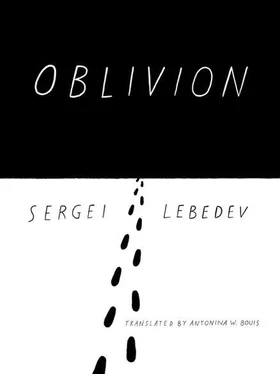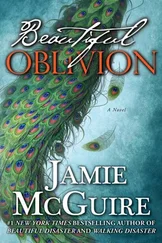It was gaping ; they say a gaping wound, and if you can move away from the details of the flesh you can see in a wound not the outline, not the shape, but the incursion of destructive shapelessness.
The quarry sucked up your gaze, where it was lost; it encountered nothing but emptiness, traces of the work of emptying; it was impossible to deal with the absurd, to let your mind think about the volume of absence.
Something was done in this place that should not be done; some line was crossed that should not be crossed in human nature—the hole of the quarry gathered the city around itself, pulled in the region.
The view of the quarry materialized the hopelessness of life, verging on despair, translated this sensation into a visual one, existing in the world as a thing; the quarry did not threaten to swallow up anything, did not beckon with fatality, it simply was—in the dull steadiness of a hole, the most immutable thing, and that man is transient compared to its immutability was almost unbearable.
I left the quarry, but I could have stayed; distances meant nothing here. The quarry was carved into my consciousness; before I did not know how the human world looked without humans; now I knew.
At the bus stop—a shift had just ended—I heard that the rock in the quarry was deteriorating with every year; they were working with an ore content per ton that would have been considered without prospect in the past.
This was another point of view—the impoverishment of the rock, the impoverishment of the urban environment, as if the two processes were connected, not directly, but connected. Old theater posters hung at the bus stop, two months old, and no one was putting up new ones; the city was as washed out as these posters and had nothing fresh on offer; its fate was covertly intertwined with the basic activity of the residents—extracting ore in the quarry in the mine that opened veins leading away from the main mass of ore. The rock was being depleted, and the city was being depleted, for it functioned as a factory, unable to create an urban environment on its own, and people were lost within it.
It was evening; I walked along the outskirts of the town, past warehouses and garages, built close together, clinging to the neighboring wall, as if the building would fall down without it. There were rubbish heaps and packs of stray dogs, shaggy, with dried mud and burdock in their fur; each garage and each shed was built differently, but they had one thing in common: the garage and the shed were built while looking over the shoulder, with an uncertainty, with a sense that the construction was not quite legal—did you have to get permission or could you get away with it; and the sensation that the building did not quite trust the ground on which it stood combined with another sensation: that all the construction materials had been either blatantly stolen or picked up along the way. The combination of the two sensations created a third—the sensation of a life that did not look at itself, that had shrugged itself off.
The garages and sheds had been built thirty or forty years ago; the five-story buildings of the town had moved right up close to them, and the balconies on their facades—as if by an airborne architectural virus—had turned into the same dilapidated sheds, slapped together and glassed in sloppily; the houses had looked at the sheds for so long they took on their features; people lived in the concrete boxes as best they could and they increased their living space by an extra forty-three square meters, and those balconies poking out of the building facade presented a pathetic, almost illegal private life, ubiquitous and unseen, like mold; life resembling something base, self-sowing, all-penetrating.
People here bought cars to have a garage; in a city that did not know about beaches, in a city you could cross on foot in an hour, a car was just a form of winter clothing, fur-on-wheels. The crowded apartments, where men’s clothes and women’s clothes had to squeeze into a single closet, where everything was dual purpose, served two functions, like a double bed, and every spot always had more than one person—the crowded apartments got additional space with the garage, something that in the general asexuality of life, with the exception of the kitchen, had a gender specificity. Men visited one another in the garage; the garage was storage for everything that would not fit in the apartment, it was storeroom and cellar, for potatoes and pickling; a creature of the housing deficit, an appendix of lifestyle—a garage, a shed.
The town’s five-story apartment houses were ugly in their anonymous similarity, while the garages stunned you with a different ugliness; monotonous and extremely functional—walls, roof, door, that is, simply useful cubic meters—they still differed a bit; every builder tried to create a distinguishing detail: make it stand out, different from the others, add a stovepipe, bending it a special way, attach a small overhang above the door, weld an iron corner over the lock so the lugs couldn’t be broken—and these small changes became unbearably noticeable. Accumulating in your view, they repeated as attempts to be different somehow, with no possibility of doing so. I sensed that boredom was more usual here than yearning, because yearning refers to something that does not exist in a given life, while boredom asserts that there is nothing to yearn for: there is nothing anywhere, every place is the same as here.
I grew up in place just like this; it had a glue factory, and trucks from the slaughterhouse, carrying bones covered with a red-stained tarp, drove there along a pot-holed road. The trucks bounced, bones fell out, and all along the road dogs lay in the bushes waiting for a windfall; sometimes a clumsy old dog, perhaps wounded in the melee, slipped and fell under the wheels; dark wet tracks remained on the asphalt.
In the winter, the trucks going to the factory were joined by others, carrying snow to the melting station, which was under our windows; snow fell, now was beautiful—but there, behind the fence of the snow-melting station, it lay dirty and splotchy, piled up like defective hides at a slaughterhouse, and all winter I watched the absurd transport of snow to be melted, another sign of quiet, habitual madness.
Trucks carried snow, trucks carried bones, dogs, which lived in the winter by the snow-melting boilers, watched for the trucks, and everything around was waiting for something.
This anticipation, like a secret ballot, selected two genii loci, two of its permanent residents.
The old woman who came to the store with her old cat in a purse and showed him—as people came out of the store with their purchases—what she could have fed him if they increased her pension; and the old man who collected bottles in the morning and then used the kopecks he got for the movies, watching the same film a dozen times; everyone waited, everyone hoped silently; having read a lot of spy novels I hoped that a plane would accidentally drop a bundle with clothing, money, gun, and documents, a package with a different fate.
There were a lot of poplars in the area, and in the summer the wind chased balls of dusty gray fluff along the sidewalks; later, in the Kazakhstan desert, I saw balls of tumbleweed and I learned that the infinity of boredom was the indifferent repetition of life. I understood that I had experienced that sensation before—it was the background of my childhood: trucks with bones, trucks with snow, stray dogs by the road, clumps of fluff in the gutter, carried by the wind.
It wasn’t that nothing new ever happened in the neighborhood of my childhood; worse was that there was nothing old in it: its houses, built to depopulate the dormitories, communal flats, and rooms with eight people in eight square meters, started falling apart the moment they were built; they lacked the dignity of age. Life did not expand, it limped along, going nowhere.
Читать дальше












